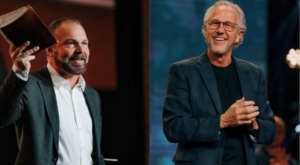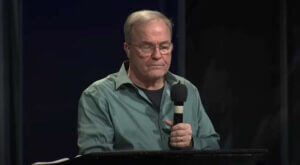I grew up on the Jersey Shore. (No, it wasn’t like the TV show.) Every summer morning I’d see several men combing the beach with metal detectors looking for jewelry and change lost the day before. One lost diamond earring or ring could pay for the metal detector several times over.
But as useful and successful as metal detectors are, they can’t be used to find everything. Metal detectors won’t help you find wood, plastic, rubber or other nonmetallic objects.
Now, suppose metal-detector man, after just combing the beach, says to you, “I know there’s no plastic or rubber on that beach because I looked for those things with my metal detector and found nothing!” Then suppose he goes even further and says, “There’s not only no plastic or rubber on that beach, there is no plastic or rubber anywhere because I’ve never found a speck of it with my metal detector!” Meanwhile, you can’t help but notice that his metal detector is made of mostly plastic and rubber.
You’d think, “Is metal-detector man nuts? He’s certainly not thinking properly.”
That’s what Dr. Edward Feser, who thought of this illustration, thinks about atheists who insist that all truth comes from science. The atheists are like metal-detector man, and science is their metal detector. Because their chosen tool—science—has been so successful in discovering material causes in the natural world, atheists mistakenly assume that nothing but material things exist.
Just like metal-detector man doesn’t realize that plastic and rubber are part of his metal detector—in fact, it couldn’t work without them— some atheists don’t seem to realize that immaterial realities are part of science, and science couldn’t work without them.
When the new atheists (such as Richard Dawkins and Sam Harris) refer to “science,” they are normally referring to the study of material causes in fields such as physics, chemistry, biology, cosmology and astronomy. There’s obviously much to gain by studying those areas of reality. The problem arises when the new atheists assert that those are the only areas of reality—that everything can be explained by material causes, and all truth comes from science.
Such an assertion is obviously false. In fact, the claim “all truth comes from science” didn’t itself come from science. It’s not a scientific truth, but a philosophical claim about science. So the claim is self-defeating.
As I argue in my new book, Stealing from God: Why atheists need God to make their case (from which this column is adapted), we learn truth in many ways other than the physical sciences. For example, you can’t know or learn any truths without relying on the self-evident philosophical principles such as the laws of logic and mathematics. In fact, science itself is impossible without them.
We all know the basic moral truths because they are, as Thomas Jefferson put it, “self-evident.” Running a scientific experiment will not help you discover them. You can’t get honesty from a test tube—you need to be honest to run experiments in the first place! In other words, scientists themselves must behave morally by reporting the data from their experiments accurately.
You don’t need to be a scientist to learn basic truths through your senses either (call me crazy, but you don’t need to run a scientific experiment to learn if there’s a screen in front of you right now!). And certain truths you know directly through introspection (like whether you are hungry, tired, interested, bored, “in love,” convinced, doubtful and so on). The testimony of others is still another way you can learn truth about historical events or those in the present day. And the list goes on.
If fact, if atheism were true, we wouldn’t be able to learn anything reliably, even from science itself. Atheists assert that only molecules exist. But if that’s the case, then human beings don’t have free will or the ability to reason. We are merely moist robots whose actions are completely determined by the laws of physics.
So why should we believe anything atheists say, including any of their scientific conclusions or their reasons for believing atheistic materialism is true? They arrived at their conclusions not by reason, but because the laws of physics determined they would arrive at their conclusions.
Atheist Thomas Nagel is a professor at New York University whose recent book set off an atheist inquisition against him for expressing doubts about the atheistic worldview. He wrote, “Evolutionary naturalism provides an account of our capacities that undermines their reliability, and in doing so undermines itself.” Indeed, atheism scuttles free will and destroys our confidence in everything we think.
A metal detector can’t even find metal without relying on non-metallic things such as rubber, plastic and electricity. Likewise, scientists can’t find material causes without relying on the immaterial realities that are necessary for anyone to do science in the first place, such as the laws of logic, mathematics, consistent natural laws, and the very existence of our minds that go beyond the mere molecules of our brains.
Since science depends on those realities, atheists can’t use science to deny that some of them exist. Feser says that doing so is “utterly fallacious—as fallacious as appealing to the success of metal detectors in order to support the claim that only metal exists.” The man who does, Feser writes, “is like the drunk who thinks his car keys must be under the lamppost because that is the only place there is light to look for them—and who refuses to listen to those who have already found them elsewhere.”
Of course I’m not saying atheists can’t do science. Obviously they can. What I am saying is that they are unwittingly stealing from God’s immaterial universe in order to do science. Atheistic materialism has destroyed all tools necessary to do the job! So ironically, it’s not religion that’s at war with science—it’s atheism that’s at war with science.
Frank Turek is the president of crossexamined.org, coauthor of I Don’t Have Enough Faith to be an Atheist, and the author of the new book Stealing From God: Why Atheists Need God to Make Their Case.
See an error in this article?
To contact us or to submit an article



















